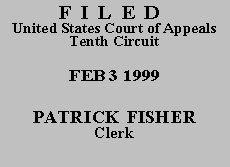

| UNITED STATES OF AMERICA,
Plaintiff-Appellee, v. CHARLES FREDERICK LEONARD, Defendant-Appellant. |
|
Defendant Charles F. Leonard appeals from the denial of his motion to vacate, set aside or correct sentence under 28 U.S.C. § 2255. The district court also denied a certificate of appealability (COA) pursuant to 28 U.S.C. § 2253(c), so our threshold task is to determine whether defendant has "made a substantial showing of the denial of a constitutional right," the prerequisite for obtaining a COA and thereby invoking our appellate jurisdiction under § 2253(c)(2). We hold that he has not and, accordingly, deny COA and dismiss the appeal.
A brief recitation of pertinent procedural history will lay the groundwork for a concise disposition of the COA question. Based on a statement he had given in the course of a state homicide investigation, defendant was indicted on federal drug conspiracy and continuing criminal enterprise (CCE) charges for his role in a methamphetamine operation in Oklahoma. Defense counsel moved to suppress the statement, asserting that it had been given in exchange for a promise of immunity and therefore was barred from use by that promise or rendered inadmissible as involuntary in the event that promise were breached. See R. Vol. 1 tabs 34, 65. The district court denied the motion on the basis that defendant had given the statement voluntarily without any promise of federal immunity. See Sept. 20, 1990 Presentence Hearing Tr. at 132-34. Thereafter, defendant entered an unconditional guilty plea to the CCE count in exchange for dismissal of the conspiracy count and a pending state murder charge, as well as other sentencing-related concessions.
On direct appeal from his conviction and sentence, defendant contended his plea rested on an erroneous assurance by counsel that he would be able to appeal the earlier, now waived, suppression ruling. Unable to resolve this ineffective assistance issue on the record, the court remanded for an evidentiary hearing to determine whether counsel had erroneously informed defendant regarding his appellate rights and, if so, the extent to which he relied upon that advice in deciding to plead guilty. See United States v. Leonard, No. 91-5021, 1992 WL 232468, at **4-5 (10th Cir. Aug. 28, 1992).
Defendant and former defense counsel testified at the hearing. Ultimately, the district court found defendant had entered his plea "with full knowledge that he had forfeited any issue that he could raise had he rejected the government's concessions and went to trial." R. Vol. 2 tab 131 at 5. The court concluded that defendant's claim of ineffective assistance of counsel was "unfounded" and that he had pled guilty "based on his decision to accept a favorable plea rather than face the potential of a less favorable result from trial." Id. at 5-6. On appeal, we reviewed the district court's factual findings for clear error and, discerning none, affirmed defendant's conviction. See United States v. Leonard, No. 93-5085, 1994 WL 47158 (10th Cir. Feb. 15, 1994).
Nearly three years later, defendant filed the § 2255 motion currently under review. Defendant asserted twenty-seven grounds for relief, in many instances attempting to resurrect, directly or in slightly altered guise or focus, interrelated immunity/suppression/ineffective assistance issues effectively foreclosed by his plea and former appeal. The district court denied the motion after individually addressing each and every ground raised, see R. Vol. 3 tab 193, and thereafter denied COA.
We have reviewed defendant's application for COA and accompanying brief in light of the record on appeal, the district court's thorough analysis, and the prior decisions issued in this case. Without going into unwarranted detail, we note that some of the myriad matters urged below have been abandoned through omission. See generally United States v. Fisher, 38 F.3d 1144, 1146 n.1 (10th Cir. 1994) (§ 2255 decision holding "district court's resolution of [unpresented] issue stands"). As none of the remaining issues raises a constitutional question "debatable among jurists," we deny COA and dismiss the appeal. United States v. Williams, 118 F.3d 717, 718 (10th Cir.), cert. denied, 118 S. Ct. 636 (1997).
Defendant's application for a certificate of appealability is DENIED and this appeal is DISMISSED.
Entered for the Court
Circuit Judge
*. This order and judgment is not binding precedent, except under the doctrines of law of the case, res judicata, and collateral estoppel. The court generally disfavors the citation of orders and judgments; nevertheless, an order and judgment may be cited under the terms and conditions of 10th Cir. R. 36.3.